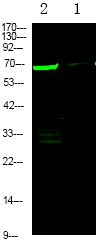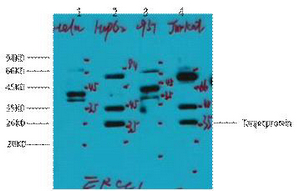L-plastin (Phospho Ser5) rabbit pAb
- Catalog No.:YP1681
- Applications:WB
- Reactivity:Human;Mouse;Rat
- Target:
- L-plastin
- Gene Name:
- LCP1 PLS2
- Protein Name:
- L-plastin (Phospho-Ser5)
- Human Gene Id:
- 3936
- Human Swiss Prot No:
- P13796
- Mouse Gene Id:
- 18826
- Mouse Swiss Prot No:
- Q61233
- Immunogen:
- Synthesized peptide derived from human L-plastin (Phospho-Ser5)
- Specificity:
- This antibody detects endogenous levels of L-plastin (Phospho-Ser5) at Human, Mouse,Rat
- Formulation:
- Liquid in PBS containing 50% glycerol, 0.5% BSA and 0.02% sodium azide.
- Source:
- Polyclonal, Rabbit,IgG
- Dilution:
- WB 1:500-2000
- Purification:
- The antibody was affinity-purified from rabbit serum by affinity-chromatography using specific immunogen.
- Concentration:
- 1 mg/ml
- Storage Stability:
- -15°C to -25°C/1 year(Do not lower than -25°C)
- Other Name:
- Plastin-2 (L-plastin) (LC64P) (Lymphocyte cytosolic protein 1) (LCP-1)
- Molecular Weight(Da):
- 69kD
- Background:
- Plastins are a family of actin-binding proteins that are conserved throughout eukaryote evolution and expressed in most tissues of higher eukaryotes. In humans, two ubiquitous plastin isoforms (L and T) have been identified. Plastin 1 (otherwise known as Fimbrin) is a third distinct plastin isoform which is specifically expressed at high levels in the small intestine. The L isoform is expressed only in hemopoietic cell lineages, while the T isoform has been found in all other normal cells of solid tissues that have replicative potential (fibroblasts, endothelial cells, epithelial cells, melanocytes, etc.). However, L-plastin has been found in many types of malignant human cells of non-hemopoietic origin suggesting that its expression is induced accompanying tumorigenesis in solid tissues. [provided by RefSeq, Jul 2008],
- Function:
- function:Actin-binding protein found in intestinal microvilli, hair cell stereocilia, and fibroblast filopodia.,PTM:Phosphorylated.,PTM:The N-terminus is blocked.,similarity:Contains 2 actin-binding domains.,similarity:Contains 2 EF-hand domains.,similarity:Contains 4 CH (calponin-homology) domains.,subunit:Monomer.,tissue specificity:Restricted to the spleen and other lymph node-containing organs. Expressed in neutrophils, monocytes, B lymphocytes, and myeloid cells.,
- Subcellular Location:
- Cytoplasm, cytoskeleton . Cell junction . Cell projection . Cell projection, ruffle membrane ; Peripheral membrane protein ; Cytoplasmic side . Relocalizes to the immunological synapse between peripheral blood T-lymphocytes and antibody-presenting cells in response to costimulation through TCR/CD3 and CD2 or CD28 (PubMed:17294403). Associated with the actin cytoskeleton at membrane ruffles. Relocalizes to actin-rich cell projections upon serine phosphorylation (PubMed:16636079). .
- Expression:
- Detected in intestinal microvilli, hair cell stereocilia, and fibroblast filopodia, in spleen and other lymph node-containing organs. Expressed in peripheral blood T-lymphocytes, neutrophils, monocytes, B-lymphocytes, and myeloid cells.
- June 19-2018
- WESTERN IMMUNOBLOTTING PROTOCOL
- June 19-2018
- IMMUNOHISTOCHEMISTRY-PARAFFIN PROTOCOL
- June 19-2018
- IMMUNOFLUORESCENCE PROTOCOL
- September 08-2020
- FLOW-CYTOMEYRT-PROTOCOL
- May 20-2022
- Cell-Based ELISA│解您多样本WB检测之困扰
- July 13-2018
- CELL-BASED-ELISA-PROTOCOL-FOR-ACETYL-PROTEIN
- July 13-2018
- CELL-BASED-ELISA-PROTOCOL-FOR-PHOSPHO-PROTEIN
- July 13-2018
- Antibody-FAQs
- Products Images

- Western Blot analysis of 1 K562 cell, 2 LPS 100ng/mL 30min treated ,using primary antibody at 1:1000 dilution. Secondary antibody(catalog#:RS23920) was diluted at 1:10000



